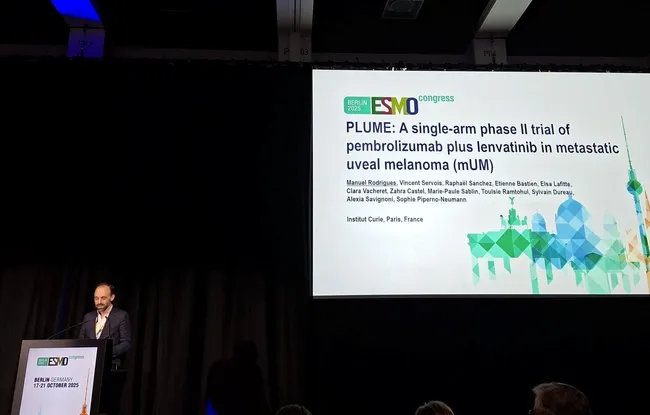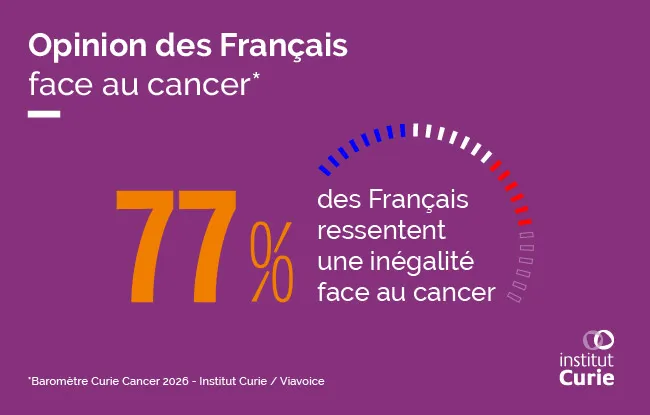- Home >
- Institut Curie News >
- ESMO 2025 - Metastatic uveal melanoma: a promising new treatment combination
It is crucial to develop new therapeutic strategies for patients with metastatic uveal melanomas, the most common malignant tumors of the eye in adults, for which Institut Curie is a national reference center. In this context, Phase 2 PLUME clinical trial aims to evaluate the efficacy and tolerability of a combination of an immunotherapy using anti-PD-1 antibodies with a targeted treatment. The first results of this PLUME study will be presented by Dr. Manuel Rodrigues, principal investigator of the PLUME clinical trial, and clinician-scientist at Institut Curie in a mini oral session at the ESMO congress on October 18, 2025.
With 500 new cases diagnosed each year in France1, uveal melanoma is a rare cancer affecting the uvea, the pigmented membrane inside the eye that includes the choroid (tissue covering the retina), iris and ciliary body. This is the most common malignant eye tumor in adults, for which metastases (often in the liver) are frequent. Institut Curie is a national expert center for the management of patients with uveal melanoma.
The standard treatment for metastatic uveal melanoma is immunotherapy with tebentafusp, a bispecific antibody (capable of redirecting the patient's CD3+ T lymphocytes against the gp100 glycoprotein expressed by skin cells and melanoma tumor cells). But Tebentafusp can only be used in about 45% of patients (those with a specific form of HLA (HLA serotype*02:01)2), necessary to trigger this anti-melanoma immunity). Other immunotherapies such as anti-PD-1 have a lower efficacy, illustrating the need to identify new treatment strategies for patients with metastatic uveal melanomas.
Phase 2 PLUME clinical trial aims to evaluate the efficacy and tolerability of the combination of immunotherapy using an anti-PD-1 antibody (pembrolizumab) with targeted treatment (lenvatinib - tyrosine kinase inhibitor). "There are pre-clinical and clinical data that show that this combination of lenvatinib with pembrolizumab is more effective than monotherapy, especially in endometrial and kidney cancers," specifies Dr Manuel Rodrigues, principal investigator of the PLUME clinical trial, medical oncologist and researcher at Institut Curie.
The positive results presented at the ESMO show that in the 51 patients included in the study, the combination of immunotherapy with targeted therapy reached the main evaluation criterion (namely fewer relapses at 6 months than expected with pembrolizumab alone).
"The treatment was particularly effective in patients who had previously been treated with tebentafusp. Our hypothesis is that tebentafusp triggers an immune reaction, which is reactivated or amplified by the combination of pembrolizumab and lenvatinib. Currently, we are continuing our work in order to understand if the addition of lenvatinib is essential in this situation, and we are also exploring biomarkers that would allow us to better understand the success of this treatment in some people and not in others, " concludes Dr. Manuel Rodrigues.
PLUME : a single-arm phase II trial of pembrolizumab (pembro) plus lenvatinib (lenva) in patients (pts) with metastatic uveal melanoma (mUM) – Session mini-oral : october 18, 2025 – Dr Manuel Rodrigues
Genomic profiles studied to better understand and predict the efficacy of immunotherapy with tebentafusp
In addition, a retrospective study conducted at Institut Curie and presented at the ESMO 2025 congress analyzed 168 patients with metastatic uveal melanoma treated with tebentafusp between 2018 and 2024 (patients with a specific form of HLA). The results show an efficacy comparable to that observed in the registration trial of this treatment, which was well tolerated. This study reveals that genomic profiles (loss of BAP1, monosomy 3, SF3B1/EIF1AX mutations) do not seem to predict the response to treatment but location of metastases might (with mixed hepatic and extra-hepatic lesions being of worse prognosis than liver-exclusive).
Clinical and molecular outcomes of tebentafusp in metastatic uveal melanoma (MUM): A retrospective cohort of 168 patients. Poster session Melanoma and other skin tumours - October 20 – Dr Raphaël Sanchez
Early Together: a French study to evaluate the benefits of supportive care in the management of metastatic uveal melanoma
When uveal melanoma becomes metastatic, symptoms often appear very late and very quickly, making it difficult to implement supportive care. A multicenter phase 3 study, “Early Together,” coordinated by Dr. Sophie Piperno-Neumann, an oncologist at the Institut Curie, evaluates the early introduction of palliative care from the start of oncological treatment in patients with metastatic uveal melanoma, focusing on information needs and supportive care. From July 2020 to January 2024, 162 patients were randomized across two participating centers (Paris and Nice): palliative care was introduced according to recommendations for one group. In the other group, palliative care consultations began at the oncologist’s announcement of metastases and continued for one year. The results presented at ESMO show no significant difference between the groups; however, further analyses are underway.
Early together: Randomized phase 3 trial of early palliative care (EPC) integration in metastatic uveal melanoma (MUM) – session poster Palliative care – October 19, 2025 – Dr Sophie Piperno-Neumann
[1] Source National Cancer Institute
[2] The HLA gene, for Human Leukocyte Antigen, codes for a protein expressed on the surface of immune cells. A sort of “cellular passport,” this protein serves to recognize the body’s cells among themselves.



